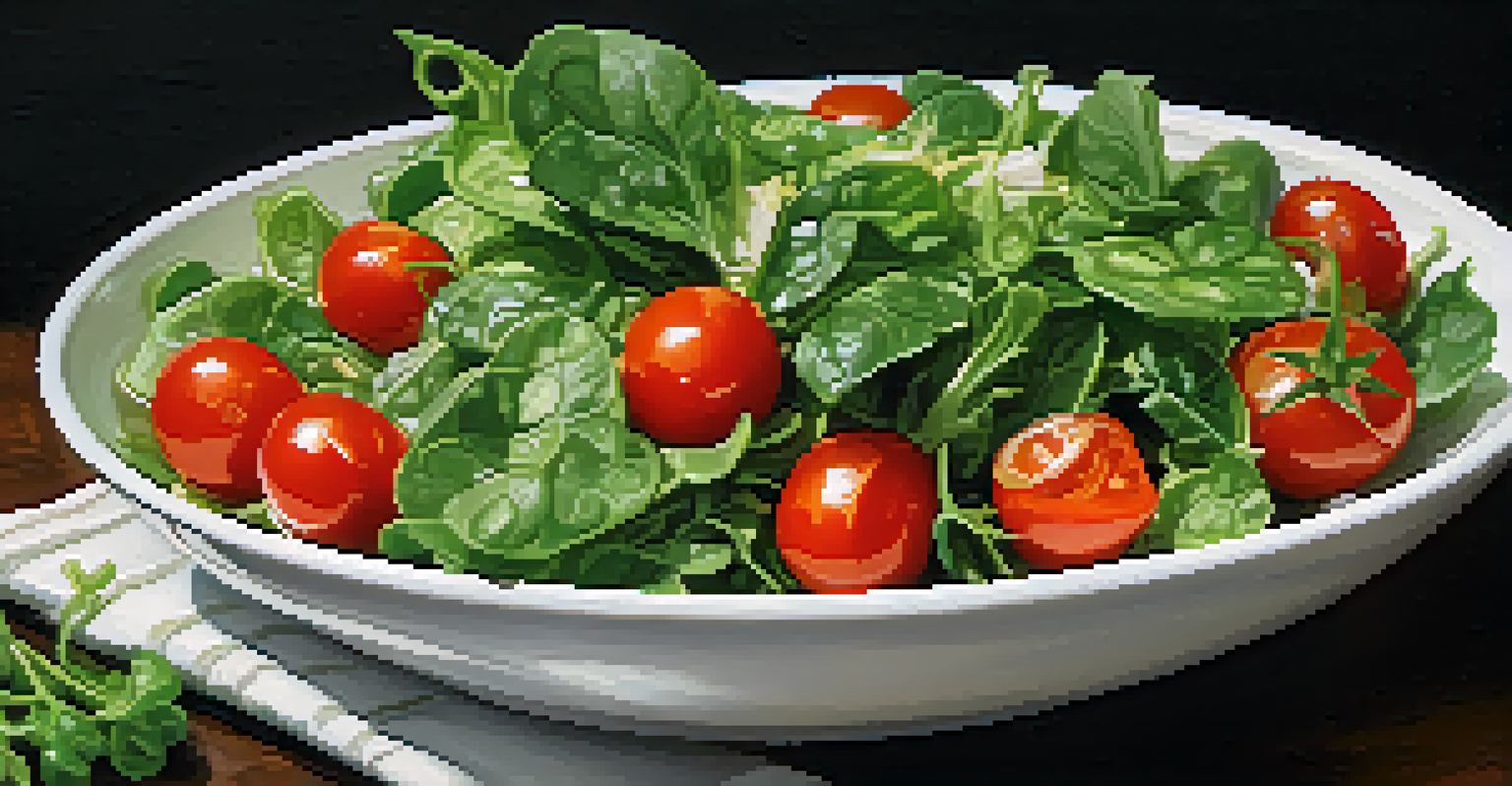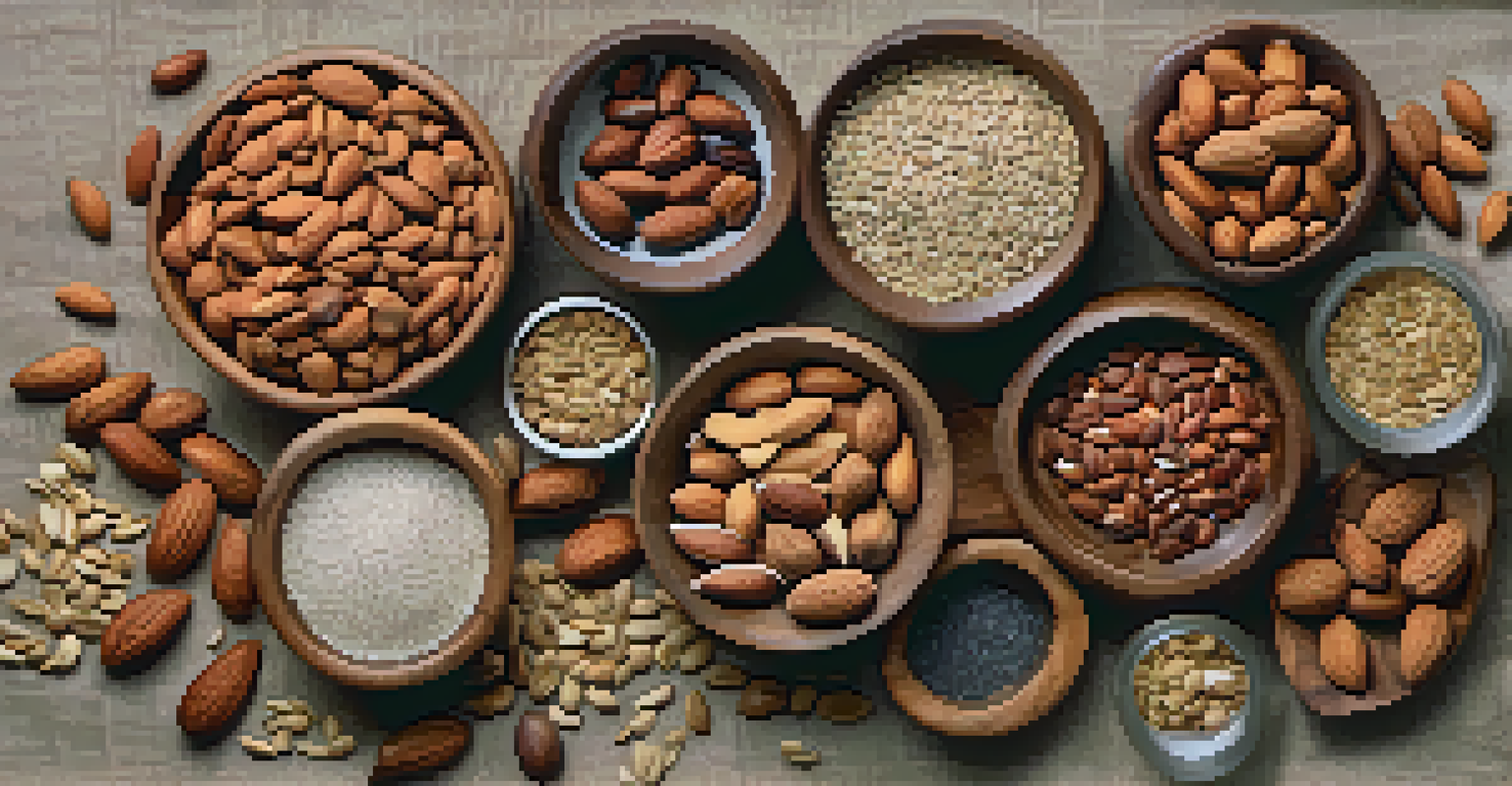Essential Raw Foods to Support Intermittent Fasting Goals

Understanding Intermittent Fasting and Its Benefits
Intermittent fasting (IF) is a popular eating pattern where you cycle between periods of eating and fasting. It’s not just about skipping meals; it’s about giving your body time to heal and rejuvenate. This approach can lead to various health benefits, including weight loss, improved metabolic health, and better mental clarity.
Let food be thy medicine and medicine be thy food.
During fasting periods, your body shifts from using glucose as its primary energy source to burning fat. This metabolic switch can enhance fat burning and promote weight loss, making it an attractive option for many. Furthermore, studies suggest that IF can reduce inflammation, improve heart health, and even support brain function.
To make the most of intermittent fasting, it’s crucial to choose the right foods during eating windows. Raw foods, in particular, can provide essential nutrients without overwhelming your digestive system, enhancing your fasting experience and supporting your overall goals.
The Role of Raw Foods in Your Diet
Raw foods, which are uncooked and unprocessed, retain more nutrients than their cooked counterparts. This means that when you incorporate these foods into your intermittent fasting plan, you’re maximizing your nutrient intake. Think of raw foods as nature’s multivitamins—providing vitamins, minerals, and enzymes that are often diminished through cooking.

In addition to being nutrient-dense, raw foods are typically low in calories and high in fiber. This makes them an excellent choice for snacking during your eating windows, as they can help keep you full without consuming too many calories. Foods like fresh fruits and vegetables can curb hunger while providing a satisfying crunch.
Intermittent Fasting Basics
Intermittent fasting is more than just meal skipping; it allows your body to heal and can lead to various health benefits.
Moreover, raw foods are often more hydrating due to their high water content, which can be beneficial during fasting. Staying hydrated is crucial, and raw foods can help you achieve that while also nourishing your body.
Leafy Greens: A Must-Have for Your Raw Food Menu
Leafy greens are among the best raw foods to support your intermittent fasting goals. Varieties like spinach, kale, and arugula are packed with vitamins A, C, and K, as well as important minerals like iron and calcium. These nutrients play a vital role in maintaining your overall health while you fast.
You are what you eat, so don't be fast, cheap, easy, or fake.
Incorporating leafy greens into your meals can enhance your nutrient intake without adding many calories. For example, tossing a handful of fresh spinach into your smoothie can boost its nutritional value significantly. Plus, the fiber in leafy greens aids digestion and helps you feel full longer.
You can enjoy leafy greens in salads, smoothies, or even as wraps. Their versatility makes it easy to include them in your eating windows, ensuring you get the necessary nutrients to keep you energized throughout your fasting journey.
Nuts and Seeds: Nutrient-Dense Snacks
Nuts and seeds are excellent raw food options to include in your intermittent fasting regimen. Almonds, walnuts, chia seeds, and flaxseeds are packed with healthy fats, protein, and fiber, making them satiating and nutritious. These little powerhouses can help curb cravings and keep you satisfied between meals.
One of the great things about nuts and seeds is their portability. Whether you’re at work, running errands, or simply at home, a small handful can provide an instant energy boost without a lot of fuss. They also offer a variety of flavors and textures, which can keep your snacks interesting.
Raw Foods Enhance Nutrient Intake
Incorporating raw foods into your diet maximizes nutrient absorption and supports your fasting journey.
In addition, nuts and seeds have been linked to numerous health benefits, including improved heart health and reduced inflammation. By including these in your diet, you’re not only satisfying your hunger but also supporting your long-term health.
Fruits: Sweet and Satisfying Energy Boosters
Fruits are another fantastic raw food option, providing natural sweetness along with essential vitamins and minerals. Berries, apples, and bananas can be particularly satisfying and can help curb sweet cravings during your eating windows. They’re not only delicious but also packed with antioxidants, which can support your immune system.
The high water content in fruits can also help keep you hydrated, which is vital while intermittent fasting. Staying hydrated can stave off feelings of hunger and fatigue, making your fasting experience more enjoyable. A fresh fruit salad or a smoothie can be a refreshing addition to your meal.
Furthermore, fruits are versatile and can be incorporated into various dishes, from salads to desserts. Their natural sweetness allows you to enjoy satisfying snacks without added sugars, making them a perfect choice for your intermittent fasting goals.
Fermented Foods: Supporting Gut Health
Fermented raw foods like sauerkraut, kimchi, and kefir are excellent for supporting gut health, especially during intermittent fasting. These foods are rich in probiotics, which are beneficial bacteria that promote a healthy gut microbiome. A healthy gut can improve digestion and enhance nutrient absorption, both of which are crucial while you’re fasting.
Including fermented foods in your diet can also help reduce bloating and discomfort, which some people experience when they first start fasting. The probiotics in these foods can help balance your gut flora, making your digestive system more resilient and efficient.
Hydration is Crucial While Fasting
Staying hydrated with water and hydrating raw foods is essential to manage hunger and maintain energy during intermittent fasting.
You can enjoy fermented foods as a side dish or incorporate them into salads and bowls. Their tangy flavor adds a unique twist to your meals, making healthy eating feel less like a chore and more like a delightful experience.
Healthy Fats: Fueling Your Fasting Journey
Incorporating healthy fats from raw foods into your diet can provide sustained energy during your intermittent fasting periods. Avocados, olives, and coconut are fantastic sources of healthy fats that can help keep you full and satisfied. These fats are essential for your body, as they support cell function and hormone production.
Healthy fats also slow down digestion, which can help you feel full longer. For instance, adding sliced avocado to your salads or smoothies can create a creamy texture while providing essential nutrients. This can be particularly beneficial during your eating windows, as it allows you to enjoy a satisfying meal without overeating.

Moreover, healthy fats are important for overall health, including heart health and brain function. By incorporating them into your raw food diet, you’re not just supporting your fasting goals; you’re also nourishing your body for the long haul.
Hydration: The Key to Successful Intermittent Fasting
While focusing on raw foods, don’t overlook the importance of hydration during intermittent fasting. Drinking plenty of water is crucial, as it helps maintain energy levels and supports metabolic processes. Additionally, staying hydrated can help curb feelings of hunger, making your fasting experience more manageable.
Incorporating hydrating raw foods, such as cucumbers, watermelon, and celery, can be a great way to boost your fluid intake. These foods can provide a refreshing crunch and a natural source of hydration that supports your overall health. Plus, they’re low in calories, making them a smart choice for your fasting goals.
You can also enjoy herbal teas or infused water during fasting periods. These options can add variety to your hydration routine and keep your taste buds satisfied. Remember, staying hydrated is a vital part of your intermittent fasting journey, so make it a priority!